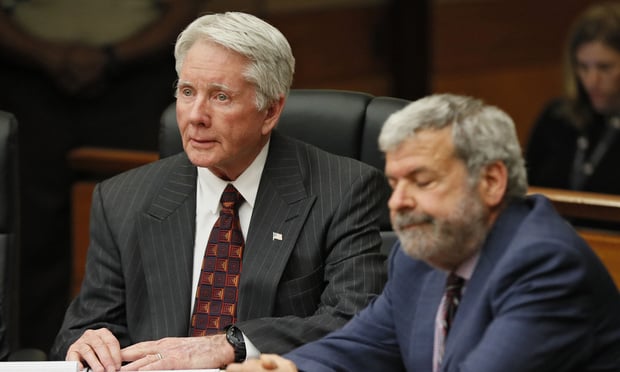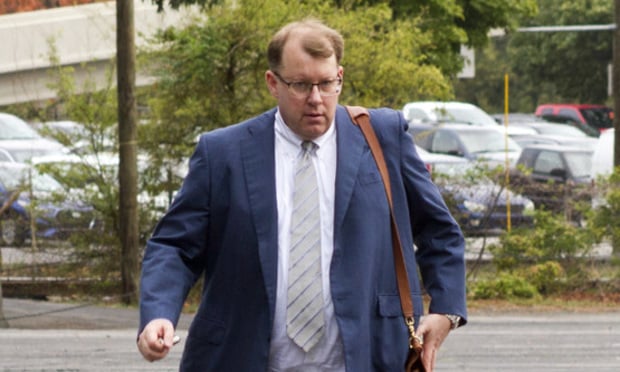A Year in Review: The Fall of Attorneys Tex McIver and Nathan Hardwick
First up in our two-part year in review, a look back at the big trials targeting the misdeeds of two Georgia attorneys.
December 26, 2018 at 12:16 PM
6 minute read
 Tex McIver (left) and defense attorney Don Samuel react to the Fulton County jury announcing guilty verdicts against McIver for the killing of his wife. (Pool photo: Bob Andres/AJC)
Tex McIver (left) and defense attorney Don Samuel react to the Fulton County jury announcing guilty verdicts against McIver for the killing of his wife. (Pool photo: Bob Andres/AJC)
Cases involving allegations of lawyer misconduct are always intriguing, but some of the biggest trials of 2018 stretched the boundaries of the usual fare.
There was the high-flying residential real estate lawyer now bound for prison after looting his firm for millions of dollars to fund a taste for gambling, private jets and women.
There was also the national attention focused on the trial of a former senior partner at employment firm Fisher & Phillips who will spend the rest of his life behind bars for murdering his wife in downtown Atlanta.
First up in our two-part year in review, we have a look back at the big trials targeting the misdeeds of two attorneys.
Tex McIver's Murder Trial
Securing the murder conviction of prominent Atlanta lawyer Claud “Tex” McIver in April over the 2016 shooting of his wife wasn't a sure bet for Fulton County District Attorney Paul Howard.
Police who investigated the death of Diane McIver as she rode in an SUV through downtown Atlanta initially believed the shooting was an accident. Although McIver repeatedly changed his story of how the gun went off while he was sleeping in the back seat, no motive for her murder was readily apparent.
But after McIver attempted to persuade the driver, Dani Jo Carter, to lie to police and deny she was in the car, Carter told Howard's prosecutors she no longer believed the shooting an accident.
Prosecutors quietly began to focus on money as a motive. McIver had lost his lucrative partnership at Atlanta's Fisher & Phillips, and his income had plummeted while the couple's lavish lifestyle remained intact.
Moreover, the McIvers—who kept their finances separate—were fighting over who would inherit an 80-acre ranch they jointly owned near Lake Oconee. When she died, Diane McIver held a $350,000 promissory note from her husband that he had collateralized with his share of the ranch. He had already defaulted once.
A forensic accountant who examined the McIvers' finances discovered that Diane McIver was regularly giving her husband thousands of dollars to keep his bank accounts in the black, and her death gave Tex McIver control over her lucrative estate and a quick cash infusion of more than $1 million.
Following a six-week trial, the jury appeared deadlocked before handing down a split verdict convicting McIver of felony murder, possession of a firearm during the commission of a felony, and influencing a witness. The jury cleared him of malice murder.
McIver defense lawyers Don Samuel and Bruce Harvey have filed a motion for a new trial, which is pending. Meanwhile, McIver has begun serving a life sentence.
 Nathan Hardwick enters the U.S. courthouse in Atlanta in his trial on charges of embezzlement. (Photo: John Disney/ALM)
Nathan Hardwick enters the U.S. courthouse in Atlanta in his trial on charges of embezzlement. (Photo: John Disney/ALM)Nathan Hardwick's Embezzlement Conviction
Federal prosecutors convicted Atlanta lawyer Nathan Hardwick IV of embezzling $26 million from his now-bankrupt, residential real estate closing and foreclosure firm, Morris Hardwick Schneider, in a hard-fought, three-week trial in October.
The 12 jurors did not buy Hardwick's defense that he thought the funds were legitimately due him as the firm's majority owner, and convicted him of one count of conspiracy to commit wire fraud, 21 counts of wire fraud and one count of making false statements to federally insured banks. Jurors deliberated for nine hours over two days after 12 days of witness testimony held in U.S. District Court for the Northern District of Georgia.
MHS personnel and title insurer Fidelity National Title's forensic accountants discovered millions in escrow account shortfalls in 2014 for the Atlanta-based firm's closing operation, which Hardwick ran. Hardwick received $19.5 million alone from the firm's IOLTA accounts to pay bills to casinos and private jet companies—and to his personal holding company, Divot Holdings, which he used to pay women, creditors and other expenses.
Hardwick's minority partners, Mark and Gerard Wittstadt, ousted him from the firm after the shortfalls came to light, and Fidelity poured almost $30 million into MHS's IOLTA accounts. Even so, the firm went bankrupt 11 months later.
Hardwick testified that he thought the $26 million, which he asked MHS's then-controller, Asha Maurya, to disburse to him between 2011 and 2014, was coming from available cash in the firm's operating accounts, not its escrow accounts.
Prosecutors told the jury that MHS's equity partners were only supposed to get payouts from the firm's net income, which totaled just under $10 million from 2011 to 2013, according to the firm's audited financial statements.
Hardwick's lawyers, led by Ed Garland with Robin Loeb and Kristen Novay of Garland, Samuel & Loeb, told the jury that Maurya was the sole culprit, not Hardwick.
Maurya, who has admitted taking almost $900,000 from MHS, pleaded guilty to one count of wire fraud conspiracy last year and is cooperating with the government, but prosecutors did not call her to testify.
Assistant U.S. Attorney J. Russell Phillips, who tried the case with Assistant U.S. Attorneys Doug Gilfillan and Lynsey Barron, told Judge Eleanor Ross after the verdict that the government would ask for a sentence of roughly 15 years. Hardwick, 53, was taken into custody and his sentencing hearing is scheduled for January.
This content has been archived. It is available through our partners, LexisNexis® and Bloomberg Law.
To view this content, please continue to their sites.
Not a Lexis Subscriber?
Subscribe Now
Not a Bloomberg Law Subscriber?
Subscribe Now
NOT FOR REPRINT
© 2025 ALM Global, LLC, All Rights Reserved. Request academic re-use from www.copyright.com. All other uses, submit a request to [email protected]. For more information visit Asset & Logo Licensing.
You Might Like
View All
12-Partner Team 'Surprises' Atlanta Firm’s Leaders With Exit to Launch New Reed Smith Office
4 minute read
After Breakaway From FisherBroyles, Pierson Ferdinand Bills $75M in First Year
5 minute read
On the Move: Freeman Mathis & Gary Adds Florida Partners, Employment Pro Joins Jackson Lewis
6 minute read
Veteran Litigators Move From Sidley Austin to Alston & Bird's New Chicago Office
3 minute readTrending Stories
- 1Relaxing Penalties on Discovery Noncompliance Allows Criminal Cases to Get Decided on Merit
- 2Reviewing Judge Merchan's Unconditional Discharge
- 3With New Civil Jury Selection Rule, Litigants Should Carefully Weigh Waiver Risks
- 4Young Lawyers Become Old(er) Lawyers
- 5Caught In the In Between: A Legal Roadmap for the Sandwich Generation
Who Got The Work
J. Brugh Lower of Gibbons has entered an appearance for industrial equipment supplier Devco Corporation in a pending trademark infringement lawsuit. The suit, accusing the defendant of selling knock-off Graco products, was filed Dec. 18 in New Jersey District Court by Rivkin Radler on behalf of Graco Inc. and Graco Minnesota. The case, assigned to U.S. District Judge Zahid N. Quraishi, is 3:24-cv-11294, Graco Inc. et al v. Devco Corporation.
Who Got The Work
Rebecca Maller-Stein and Kent A. Yalowitz of Arnold & Porter Kaye Scholer have entered their appearances for Hanaco Venture Capital and its executives, Lior Prosor and David Frankel, in a pending securities lawsuit. The action, filed on Dec. 24 in New York Southern District Court by Zell, Aron & Co. on behalf of Goldeneye Advisors, accuses the defendants of negligently and fraudulently managing the plaintiff's $1 million investment. The case, assigned to U.S. District Judge Vernon S. Broderick, is 1:24-cv-09918, Goldeneye Advisors, LLC v. Hanaco Venture Capital, Ltd. et al.
Who Got The Work
Attorneys from A&O Shearman has stepped in as defense counsel for Toronto-Dominion Bank and other defendants in a pending securities class action. The suit, filed Dec. 11 in New York Southern District Court by Bleichmar Fonti & Auld, accuses the defendants of concealing the bank's 'pervasive' deficiencies in regards to its compliance with the Bank Secrecy Act and the quality of its anti-money laundering controls. The case, assigned to U.S. District Judge Arun Subramanian, is 1:24-cv-09445, Gonzalez v. The Toronto-Dominion Bank et al.
Who Got The Work
Crown Castle International, a Pennsylvania company providing shared communications infrastructure, has turned to Luke D. Wolf of Gordon Rees Scully Mansukhani to fend off a pending breach-of-contract lawsuit. The court action, filed Nov. 25 in Michigan Eastern District Court by Hooper Hathaway PC on behalf of The Town Residences LLC, accuses Crown Castle of failing to transfer approximately $30,000 in utility payments from T-Mobile in breach of a roof-top lease and assignment agreement. The case, assigned to U.S. District Judge Susan K. Declercq, is 2:24-cv-13131, The Town Residences LLC v. T-Mobile US, Inc. et al.
Who Got The Work
Wilfred P. Coronato and Daniel M. Schwartz of McCarter & English have stepped in as defense counsel to Electrolux Home Products Inc. in a pending product liability lawsuit. The court action, filed Nov. 26 in New York Eastern District Court by Poulos Lopiccolo PC and Nagel Rice LLP on behalf of David Stern, alleges that the defendant's refrigerators’ drawers and shelving repeatedly break and fall apart within months after purchase. The case, assigned to U.S. District Judge Joan M. Azrack, is 2:24-cv-08204, Stern v. Electrolux Home Products, Inc.
Featured Firms
Law Offices of Gary Martin Hays & Associates, P.C.
(470) 294-1674
Law Offices of Mark E. Salomone
(857) 444-6468
Smith & Hassler
(713) 739-1250






